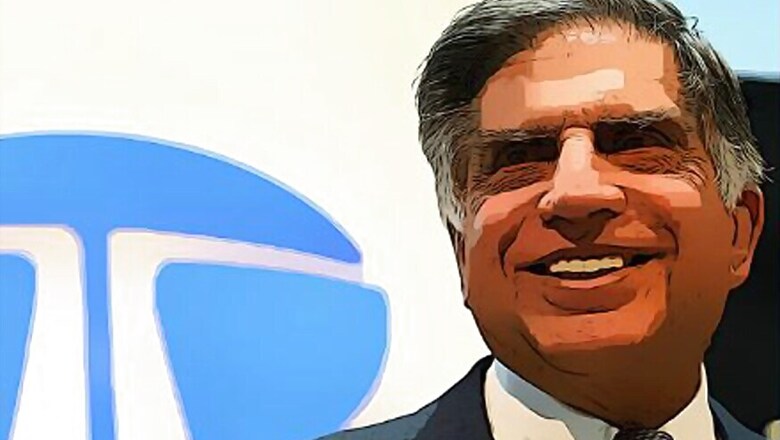
views
But behind the corporate visage is a person who values humility, has a set of core ethical principles, and would love to relearn to play the piano. Here is Ratan Tata, the man, in his own words.
Edited excerpts from an exclusive interview to CNBC TV18:
ON STICKING BY THE VALUES AND ETHICS
“I would be lying if I said there weren’t moments when those issues came up and those decisions had to be made. Happily, at every time boards stood together and leadership stood together in saying that is not what we do. We, over the years, on occasion have suffered as a result of that. However, on the whole, I believe it’s very important to come back at night and say ‘I have not succumbed’.”
ON BEING SHY
“When I was in school etc, you wanted to be part of the school and not the rich man’s son or the chairman’s son or have a big car take you home while your classmates went by bus or smaller cars. I just wanted to be a normal person. I think I owe a lot to my father to ensure that we at no stage grew up, my brother and I, as pompous young people but as people who would like to be every day and I think that has stayed with me.”
ON RELEARNING PIANO
“When I retired, I said I would relearn the piano. I have not done that. And I actually started relearning the piano. I got a very able piano teacher to come and teach me, but other things overtook my ability to be consistent. On the piano, I had one real problem. I found that I could not relate my left hand to do something different from my right hand. It became a frustrating issue and that sort of waned my urge to do what would give me many hours of joy.”
ON STEPPING INTO JRD TATA’S SHOES IN 1991
“I had a terrific mentor in JRD Tata. I remember walking back from the meeting in where I was appointed Chairman. I walked with him to his office and he told his secretary, ‘we will have to move out of here now’. I said no, you don’t move out, this is your office as long as you want it. He said, ‘really?’ I said, yes, it is. He said, ‘where would you sit’? I said where I am sitting today, I have an office down the hall and that is fine.
I was very lucky in having him there. He lent his weight when he had to, for example, the retirement age. Without his support, I could never have done that. He would explode if he thought something that was being done was wrong. He was like a father, brother, gave advice — a terrific relationship and very important.”
ON MEMORY OF 26/11 TERROR ATTACK
“To me, it started by one of my colleagues telephoning me and saying that there was some shooting at the Taj. I called the Taj and nobody replied from the switchboard. As things turned out I was not allowed into the lobby. The police came and they pushed everybody out. Krishna Kumar was standing on the footpath outside, I was partly there, partly home watching on television and it became very clear in a couple of hours that it was not a gang fight or an underworld thing, it was an attack by terrorists or by enemies of the state.
The next morning the government rang me to say it was all over. I, in fact, issued TV statement that morning, saying it was all over. But it was not. It went on for three days. By that time everyone knew what it was. It was an attack by the enemy of the state. My take on that was that whatever happened, we were under siege in this hotel and whatever they did… we will rebuild the hotel. The city would stand up and not fall down. There was a tremendous galvanising of the citizens of Mumbai, something that made everybody very proud of the way everybody stepped up to play a role. Nobody walked away from the situation as it stood and you felt a great sense of pride that you were a part of this great city.”
ON MOST DESPAIRING MOMENT
“I always felt the greatest despair I had was when Tatas decided to put Central India Mills, which was what Jamsetji started, into liquidation. If I recall at that time, it was Rs 50 lakh. I thought this was a very un-Tata like move, but it was done and many people went out of work. I saw the misery that it caused. Blue-collar workers got taken care of by the government, but the officers of the company really suffered and that has remained in my heart as a moment of despair.”
ON HIS ADMIRATION
“Two people that, apart from JRD Tata, who I admire greatly are Dr. Amar Bose who developed the Bose speakers and the Bose Corporation. He and I enjoyed a friendship that was very close and was very personal because he opened his company to me. We spent hours and hours together and discussed various things. In fact, I knew more about the Bose Corporation than most people might have done.
And the other person is Henry Schacht, who was the chairman Cummins Engine Company, where we had a joint venture. Then he became the Chairman of Lucent, which was the telecom company that merged with Alcatel. Henry continues to be today, Dr. Bose died a couple of years ago and these two are the people who have had a great influence on my career.”

















Comments
0 comment